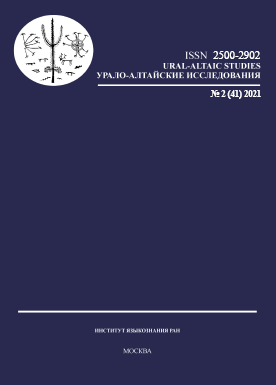ПЕРЕХОДНОСТЬ СМЫСЛОВОГО ГЛАГОЛА В ЯПОНСКИХ БЕНЕФАКТИВНЫХ КОНСТРУКЦИЯХ В СВЕТЕ КОРПУСНЫХ ДАННЫХ
MAIN VERB TRANSITIVITY IN JAPANESE BENEFACTIVE CONSTRUCTIONS IN THE LIGHT OF CORPUS DATA
Author(s): Natalia A. SolomkinaSubject(s): Theoretical Linguistics, Computational linguistics
Published by: Институт языкознания Российской академии наук
Keywords: Japanese; transitivity; verb valency; corpus linguistics; verb classes; Japanese grammar; benefactive constructions; valency classes; linguistic typology;
Summary/Abstract: Benefactive constructions in the languages of the world allow main verbs with different transitivity levels. In this article we are taking in account Japanese benefactives (analytic constructions with so-called directionality verbs) in typological context, and we examine restrictions that these constructions impose on transitivity level of the main verb. We survey the data from the Balanced Corpus of Contemporary Written Japanese (BCCWJ) and the Corpus of Spontaneous Japanese (CSJ). Using the quantitative analysis, we prove that in our datasets there is a significant statistical difference between the distribution of valency classes of the main verbs in benefactive constructions and the distribution of valency classes across randomly selected verb forms. To put it differently, the choice of a main verb depends on the restrictions imposed on the transitivity level by the benefactive construction. We also demonstrate that benefactive constructions lean toward monotransitive main verbs but are not confined to them. Our data confirm the preceding assumption that intransitive verbs with ‘give’ auxiliaries are acceptable if the receiver is not overtly expressed. But for ‘receive’ auxiliaries we do not find any limitations linking the transitivity of the main verb with the overt encoding of a benefactor or a beneficiary.
Journal: Урало-алтайские исследования
- Issue Year: 2021
- Issue No: 02 (41)
- Page Range: 133-144
- Page Count: 12
- Language: Russian

